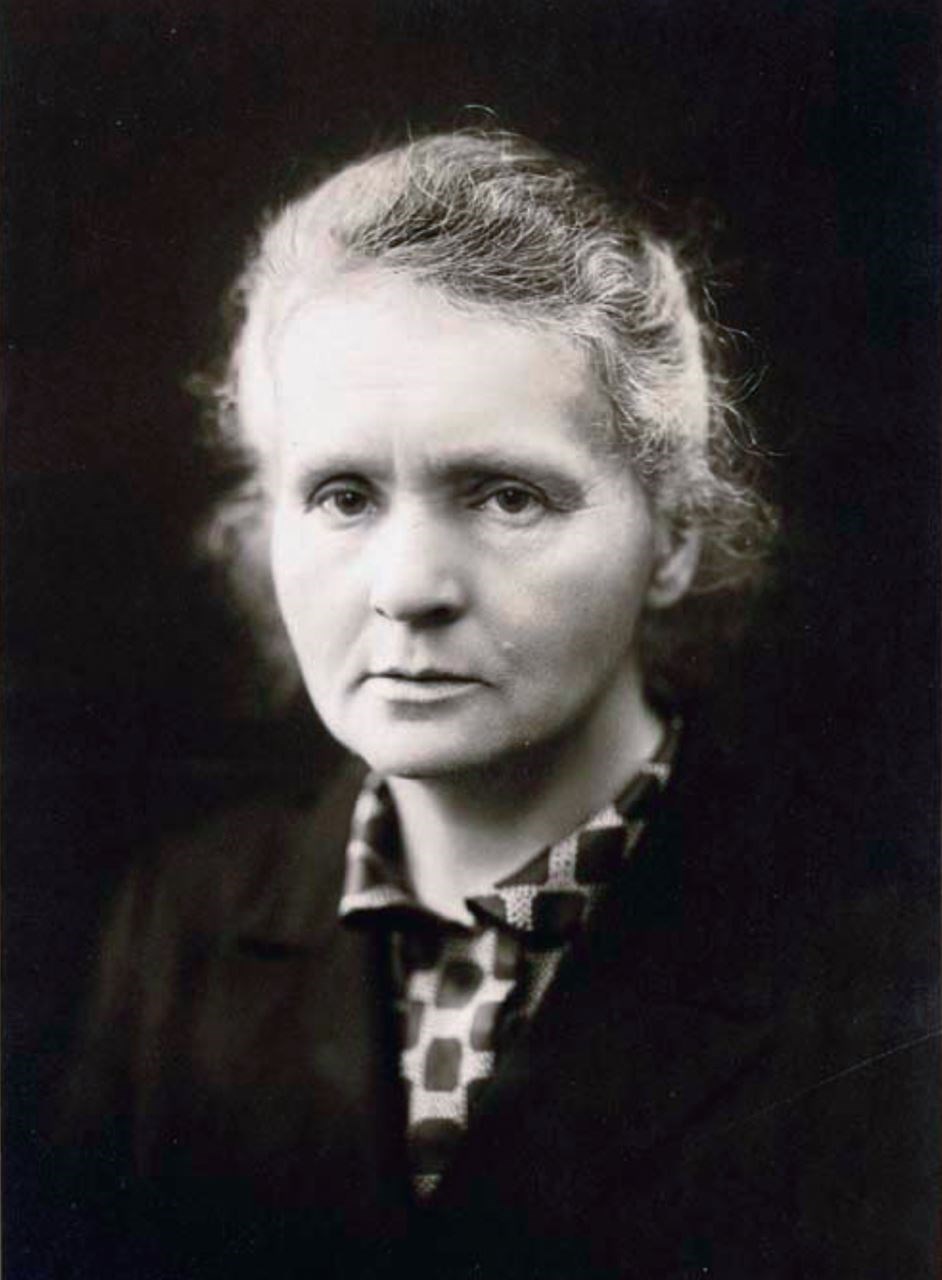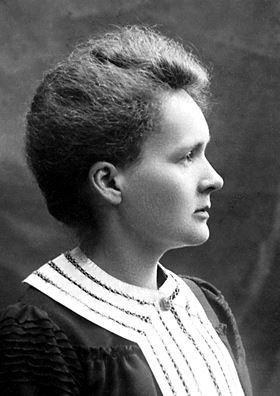 Marie CurieHenri Manuel [Public domain]"Nothing in life is to be feared, it is only to be understood. Now is the time to understand more, so that we may fear less" - Marie Curie. This principle of the importance of discovery and understanding is a subtle clue into one of the most brilliant scientific minds of the early 20th century. Born Maria Salomea Sklowdowska on November 7, 1867 in Warsaw, Poland, Marie Curie was a two-time Nobel Prize-winning physicist and catalyst for an abundance of groundbreaking scientific research. In order to pursue her passion for science, Curie conquered poverty and prejudice with immense determination and commitment. Overcoming her poverty-stricken beginnings and seriously advancing the feminist movement in her journey to become a woman of discovery makes Marie Curie a hero in every definition of the word.
Marie CurieHenri Manuel [Public domain]"Nothing in life is to be feared, it is only to be understood. Now is the time to understand more, so that we may fear less" - Marie Curie. This principle of the importance of discovery and understanding is a subtle clue into one of the most brilliant scientific minds of the early 20th century. Born Maria Salomea Sklowdowska on November 7, 1867 in Warsaw, Poland, Marie Curie was a two-time Nobel Prize-winning physicist and catalyst for an abundance of groundbreaking scientific research. In order to pursue her passion for science, Curie conquered poverty and prejudice with immense determination and commitment. Overcoming her poverty-stricken beginnings and seriously advancing the feminist movement in her journey to become a woman of discovery makes Marie Curie a hero in every definition of the word.
Both gender and social status were large obstacles Marie Curie faced for the majority of her life. As a young female interested in science at the turn of the century, Curie faced numerous obstacles in order to achieve her goals. At the time, Poland was under Russian rule, and Curie was not allowed to attend any of her country's universities. Determined to receive a college education, Curie and her sister devised a plan to come up with the funds required for the both of them to attend school outside of Poland. Marie decided to work for several years to subsidize her sibling's education, and after it was complete, the support would be reciprocated. In 1891, Curie finally left Poland for France to enroll at the Sorbonne, but her financial situation remained difficult. "Her meager savings barely covered tuition and rent for her one-room apartment; she often went for long periods without food and once fainted from hunger during class" ("Marie Curie" 1). Despite these struggles, Marie Curie's passion for learning did not waver, and she graduated first in her class with a degree in physics two years later.
With her determination and commitment to pursue a scientific career, Curie continued on to greatly impact the feminist movement and bring prominence to women working in similar fields. In 1903, Marie became the first woman in France to receive a science doctorate from the Sorbonne, and she was later awarded a Nobel Prize in Physics alongside her husband and colleague. In 1911, Curie received another Nobel Prize, in Chemistry, making her the first person in history to win two Nobel Prizes, and the only person ever to win two Nobels in two different sciences. These outstanding accomplishments disproved stereotypes about women's shortcomings in the field of science and helped pave the way for future females to pursue the career of their choosing. Coming from meager beginnings and living at a time when women were considered intellectually inferior makes Curie's accomplishments even more remarkable.
As for her scientific career, Marie was fascinated with the work of Henri Becquerel, a French physicist who had discovered uranium and its cast-off rays (later to be coined by Curie as radiation), and she decided to build on his research. Working alongside her husband Pierre, she began testing all the elements known at the time to see if any of them, like uranium, could emit radioactive waves. After the initial experimentation, she concluded that only thorium and uranium and their compounds were radioactive. Working with the mineral pitchblende of these two elements, the Curies discovered a new radioactive element in 1898. They named this element polonium, after Marie's native country. At the same time, they detected the presence of another radioactive substance in the pitchblende, and named that radium. In 1902, the Curies produced a decigram of pure radium, proving its existence as a unique chemical element. Curie later used these discoveries to aid the world in whatever way she could. When World War I began in 1914, Marie devoted her time to support the cause. "Working on her belief that knowledge was a person's strongest weapon, she invented a portable X-ray, allowing French doctors on the battlefields to locate bullets and broken bones in the bodies of wounded soldiers" (Huso 1). While her intentions were focused on learning and discovery, the scientific contributions she made to the world were profound.
 Marie CurieNobel foundation [Public domain] Within her lifetime, Marie Curie overcame all odds to revolutionize science and set the basis for future innovations. Though her research was cut short by her untimely death on July 4, 1934, her legacy and contributions to the world live on. It is only fitting that her death would come as a result of constant exposure to the materials that she discovered, materials that would later be used to save lives. She defied all preconceived notions about women in the scientific fields, and proved to the world that no matter the obstacle, there is a way to conquer it and succeed. Curie's beliefs about the importance of research and knowledge still inspire young scientists around the world, along with her heroic journey to pursue her goals and become a woman of discovery.
Marie CurieNobel foundation [Public domain] Within her lifetime, Marie Curie overcame all odds to revolutionize science and set the basis for future innovations. Though her research was cut short by her untimely death on July 4, 1934, her legacy and contributions to the world live on. It is only fitting that her death would come as a result of constant exposure to the materials that she discovered, materials that would later be used to save lives. She defied all preconceived notions about women in the scientific fields, and proved to the world that no matter the obstacle, there is a way to conquer it and succeed. Curie's beliefs about the importance of research and knowledge still inspire young scientists around the world, along with her heroic journey to pursue her goals and become a woman of discovery.
Works Cited
"Marie Curie." World of Scientific Discovery. Gale, 2006. Biography in Context. Web. 26 Mar. 2015.
"Marie Curie." Contemporary Heroes and Heroines. Vol. 2. Detroit: Gale, 1992. Biography in Context. Web. 26 Mar. 2015.
Huso, Deborah. "For the love of science: Marie Curie overcame 'poverty, grief and prejudice to become a woman of discovery." Success Nov. 2011: 84+. Biography in Context. Web. 26 Mar. 2015.
"Marie Curie." Bio. A&E Networks Television, 2015. Web. 10 Apr. 2015.
"Marie Curie." Notable Scientists from 1900 to the Present. Ed. Brigham Narins. Detroit: Gale, 2008. Biography in Context. Web. 14 Apr. 2015.
"Marie Curie - Biographical". Nobelprize.org. Nobel Media AB 2014. Web. 14 Apr 2015.
https://www.google.com/url?sa=i&rct=j&q=&esrc=s&so
https://3219a2.medialib.glogster.com/fabulouskitty
https://www.google.com/url?sa=i&rct=j&q=&esrc=s&source=images&cd=&cad=rja&uact=8&ved=0CAYQjB0&url=ht
Page created on 4/17/2015 12:00:00 AM
Last edited 9/20/2019 8:26:38 PM
